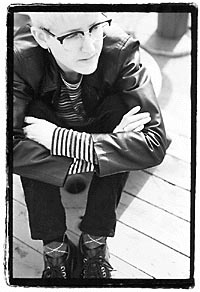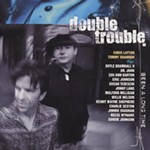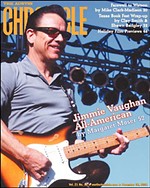Waiting for Christmas
By Andy Langer, Fri., March 5, 1999
|
|
"It burned me out," says Hentges of her four years as a Nice Girl. "If you say a word over and over and over again, it can become something meaningless. Songs can start to feel that way, too. And at the 17th straight gig, your guitar neck doesn't look like a neck anymore, but like a graph. Eventually, you even start to forget the formulas you're supposed to put on it."
That was almost seven years ago and Hentges' Two Nice Girls schedule obviously isn't the only factor behind her recent lack of live play. Brompton's Cocktail, her new and much-delayed major label debut, may sound like a straightforward and confident rock & roll album, but Hentges is the first to admit she's spent most of the those years since Two Nice Girls' breakup vacillating between sounds and approaches. Rather than offering audiences her experiments, however, Hentges says she opted to wait until she felt ready.
"I always felt a little wary of putting everything out there and realizing later it wasn't what I wanted to be," she explains. "But while I may have hesitated for a while, I finally feel like I know what I'm doing."
With her album having just hit stores, Hentges' revelation couldn't have come at a better time. Even after an EPand a full-length on Portland-based indie Tim Kerr Records, Brompton's Cocktail will most likely serve as Hentges' introduction to the public at large. Whereas her previous solo releases featured Hengtes and her band in Rolling Stones mode, Brompton's Cocktail is far more ambitious, original, and modern. Even the album's first single, "This Kind of Love," which made its debut nearly five years ago both on her EP and KNACK's Homegroan Volume 1, has been completely reborn, with crisp vocals, anthemic guitars, and whirling synths that make the older version seem wooden.
That Hentges would grow and change isn't surprising. What is remarkable about Hentges' new album, however, is how natural and unaffected it sounds in view of how long it took to finish. After all, Hentges signed with Robbins Records, a BMG-distributed label headed by Profile Records founder Cory Robbins, well over three years ago. And until now, the most any of Hentges' fans knew about the album was that two initial recording sessions were aborted, it was later recorded in pieces, and then delayed nearly six months after completion. Recently, Hentges compared the delays to foreplay; she always knew the excitement would eventually lead to the big payoff -- a finished album. The truth is even simpler: Brompton's Cocktail not only documents Hentges' newfound confidence, but also her newfound patience.
"There were times I got a little antsy, a little frustrated," she says. "But the label gave me a lot of time, space, and money. I realized I needed to give them my patience."
Hentges says finding Fountains of Wayne guitarist Adam Schlesinger in April, 1997 was the most important outcome of her patience. By that point, she had already scrapped plans to produce the album herself, and had her next set of sessions with local producer John Croslin rejected by Robbins. And while both Hentges and Robbins agreed that Schlesinger was the right producer for the project, that he was tied up recording with his Atlantic Records side-project Ivy and touring with Fountains meant Hentges' album would have to be recorded in four separate four-song chunks spread over a year. Even though this unorthodox recording process was another test of Hentges' patience, it still managed to yield an album that sounds simple and impulsive.
"I don't think it sounds forced, anal, or picked over," ventures Hentges. "I think you can hear how much we enjoyed making it and how many ideas were floating around the studio. And while the record may have been a long time coming, it took a long time to make, not a long time to record. If there was frustration once we found Adam, it was the good kind of frustration -- as in, 'It's only 4am. When can we wake Adam up?'. It was like waiting for Christmas."
In truth, Meg Hentges has waited well over three years for her proper solo debut to come together. That Hentges claims she's sketchy about exact dates and years makes it tough to pin down her age, but it's a safe guess that she's well into her 30s -- even though her black-rimmed glasses and schoolgirl looks probably haven't changed in years. As a matter of fact, Hentges now probably looks exactly like she did in her senior class picture -- if, that is, she had actually shown up for it.
"I didn't go very much to high school," admits Hentges, who says the Columbia, Missouri public school system graduated her anyway. "I was a nature girl. The high school was right next to a state park and I lived near the Missouri River. I had a real Huck Finn sort of childhood."
In the early Eighties, Hentges left Missouri and headed for Portland on the recommendation of a friend who had a sister who lived there. However flimsy her motives to relocate seemed, Hentges says her parents -- both academics at the University of Missouri -- remained supportive. Just as they encouraged her through her teenage singer-songwriter phase, they encouraged her Portland punk stage as well, where Hentges promptly turned in her hiking boots for a chance to hang at a co-op with a bar, art gallery, darkroom, and rehearsal spaces. Before long, she began a four-year stint in the Neo Boys, a seminal Northwest all-girl punk outfit that wound up on the earliest cassette-only Sub Pop compilations. In 1985, after recording an eight-song EP and a slew of singles, the Neo Boys disbanded and Hentges headed for Austin.
"In Portland, there are 65 days of sunshine a year," explains Hentges. "In Austin, there are 65 days of rain a year. When I discovered that, I knew Austin was the home I'd been looking for."
After a year or so of taking in Austin music and honing her songwriting skills, Hentges began placing a long series of ads in the Chronicle's Musician Referral classifieds. Mostly, she found drummers without drums and guitarists without amps. Before she could get a band of her own off the ground, she came across an ad she wanted to answer herself. The ad, placed by Two Nice Girls just after they recorded their first album, said they were looking for someone who could play several instruments to fill out their sound for a possible tour. What the ad didn't say was that Laurie Freelove had just left the band, that they'd be asking Hentges to sing publicly for the first time, and that Two Nice Girls frontwoman Gretchen Phillips would show up to Hentges' audition humming a Neo Boys song. She got the gig -- and an education.
"The Neo Boys were more art-oriented, more visual. The Two Nice Girls were far more political and activist," says Hentges. "I'm still not very politically savvy, but I think I learned a lot about politics when I was in Two Nice Girls. A lot of it, politically and socially, was eye-opening -- another point of view for me to consider. I didn't know much about gay politics or city politics until then. And I needed to grow up. It was the right place, right time. I could have gotten in some band of drunken fools and been in big trouble right now."
Hentges' four-year foray into politically driven rock & roll was not without trouble of its own.
"When you put yourself out there as so political, people around you develop agendas," says Hentges, still proud of the various benefit gigs Two Nice Girls played. "But when you start being unable to please even a small portion of those people, it starts to feel like everyone is pissed at you. I felt like there was a lot of anger coming from different sections of the lesbian community on exact politics and the way we worded this, where we played or didn't, or even what we wore. It started to get burdensome."
By 1992, after Hentges and the band recorded 1990's Like a Version EP and 1991's Chloe Liked Olivia, internal conflict and not politics led the band to a dramatic and infamous breakup in a Cincinnati hotel room. As professionals, they nonetheless vowed to finish the tour in separate cars and vans. Along the way back to Austin, Hentges gave several final Two Nice Girls interviews where she discussed a project she had planned for that fall -- a solo album. With no band, no songs, and no deal, it was all bluff. But it worked: By the Portland stop, Tim Kerr Records offered Hentges a solo deal only because they'd read she already had an album in the works.
Hentges' first project for Tim Kerr, the Tattoo Urge EP, was recorded just two months after Two Nice Girls' final gig. Unlike the songs she sang with Two Nice Girls, much of the Tattoo Urge material was dark and brooding, and while it came off as more Neil Young, Lou Reed, and Rolling Stones than anything Hentges had done before, it was also intentionally raw -- a first-take antithesis of Two Nice Girls' methodical recording process.
"Making that record was important, because I wanted to keep going," says Hentges. "I'm one of those people that fears sitting down and stopping. I didn't want to stop and get self-conscious and wonder if I'd be any good. Gretchen is a really brilliant performer and I didn't want to stop and think, 'Will I ever be as good as her? Will I ever be successful as Two Nice Girls?'
"At the same time, I didn't feel comfortable continuing on with the politics or the humor. Gretchen has that mind -- a mind like a steel trap. And maybe I was intimidated. I didn't want people to say, 'Well, Two Nice Girls was great, but now she sucks.'"
Hentges' follow-up to Tattoo Urge, Afterlaugh, was also decidedly different than Two Nice Girls and just as Stones-oriented, but it served as something of a critical and commercial disappointment. Today, Hentges says that personal and financial trouble led the upbeat songs to be not as upbeat as they could have been and the sad songs to be overly sad. It was little surprise, then, that KNACK DJ Ray Seggern went back to Tattoo Urge to find "This Kind of Love" for his first sampler CD. Eventually, Hentges' song and Sincola's "Bitch" were added to the station's regular playlist. A month later, Corey Robbins came to Austin for South by Southwest, heard "This Kind of Love" on the radio and vowed to make Hentges the first signing to his new label. When he finally tracked her down a week later though Two Nice Girls' publicist Jo Rae Dimmeno, Hentges forgot to return the call.
In the year that followed his first attempt at signing Hentges, Robbins got his fledgling label off the ground with a series of dance-oriented hits, while Hentges began playing an awkward year-long residency at Steamboat. The same day Hentges stayed home waiting for the FedEx containing a new four-album deal with Kerr, Robbins called again. Immediately, Robbins asked her not to sign with Kerr contracts, and the Portland indie seemed all too eager to let Hentges negotiate with Robbins. Whereas her relationship with Tim Kerr had always been distant, Hentges was immediately impressed by Robbins' career strategy for her -- even reeling off statistics on how many, where, and to whom each of her albums had sold. The only problem, which still remains today, is that Robbins has no real track record with rock; both his companies have been built on a foundation of dance, Top 40, and hip-hop.
"That was a consideration, but I had just spent a lot of years working with people that had lots of rock credential and nothing happened," explains Hentges. "It made it a tougher call, but not a deal-breaker. Corey was just so personally persuasive without being overly flattering that I felt comfortable."
While Hentges knew immediately that she would be a priority at a small, hands-on label, she quickly found out how hands-on they were when neither her home recordings nor Croslin's sessions made the cut. In retrospect, Hentges admits both sessions may have been too Stones-oriented and that Robbins made the right call. Better yet, finding Schlesinger coincided with Hentges' most radical decision yet -- dropping the straight-rock shtick for pop.
"I started thinking about the records I had and what I loved about the radio growing up," says Hentges. "I knew that I loved pop music so much that doing the rock thing wasn't going to make me happy anymore."
That the Schlesinger sessions came in separate four bursts -- with Hentges and bassist/songwriter/ longtime partner Jude O'Nym heading to New York on short notice -- actually worked to Hentges' advantage in that she could write between sessions and record her album the same way she recorded demos at home, a few at a time. Nobody saw the six month post-production delay coming, the time Robbins needed to hire in-house publicists and radio promoters to work a pop album, but that also worked out well for Hentges in that she had ample time to assemble and rehearse with her new band: O'Nym, guitarists Dan Crandell and Andy Loomis, and drummer Keri Cinquina. If next month's plans to take "This Kind of Love" to college and modern rock radio pan out, Hentges and band could be breaking their live drought in a big way.
"I know this is going to be a long, multi-layered process, but I'm ready to get back on the road again and attempt to build up a following and start building a career. I don't have Fastball-size expectations, but I think it's going to be fun either way.
"It's like Corey says, 'It's up to the record now. You did what you did and now we're going to try and sell it.' It may be a cliché, but either people will like the record or they won't, and there's nothing I can do about it except try to present it to them and get them to hear it. That's the challenge ahead.
"And while I know it will probably be all perks and no pay, that's better than the way it's been -- lots of waiting, no pay, and no perks. It's all gonna be okay." *
Meg Hentges' South by Southwest showcase is at the Copper Tank North, Friday, March 19, 1am.









